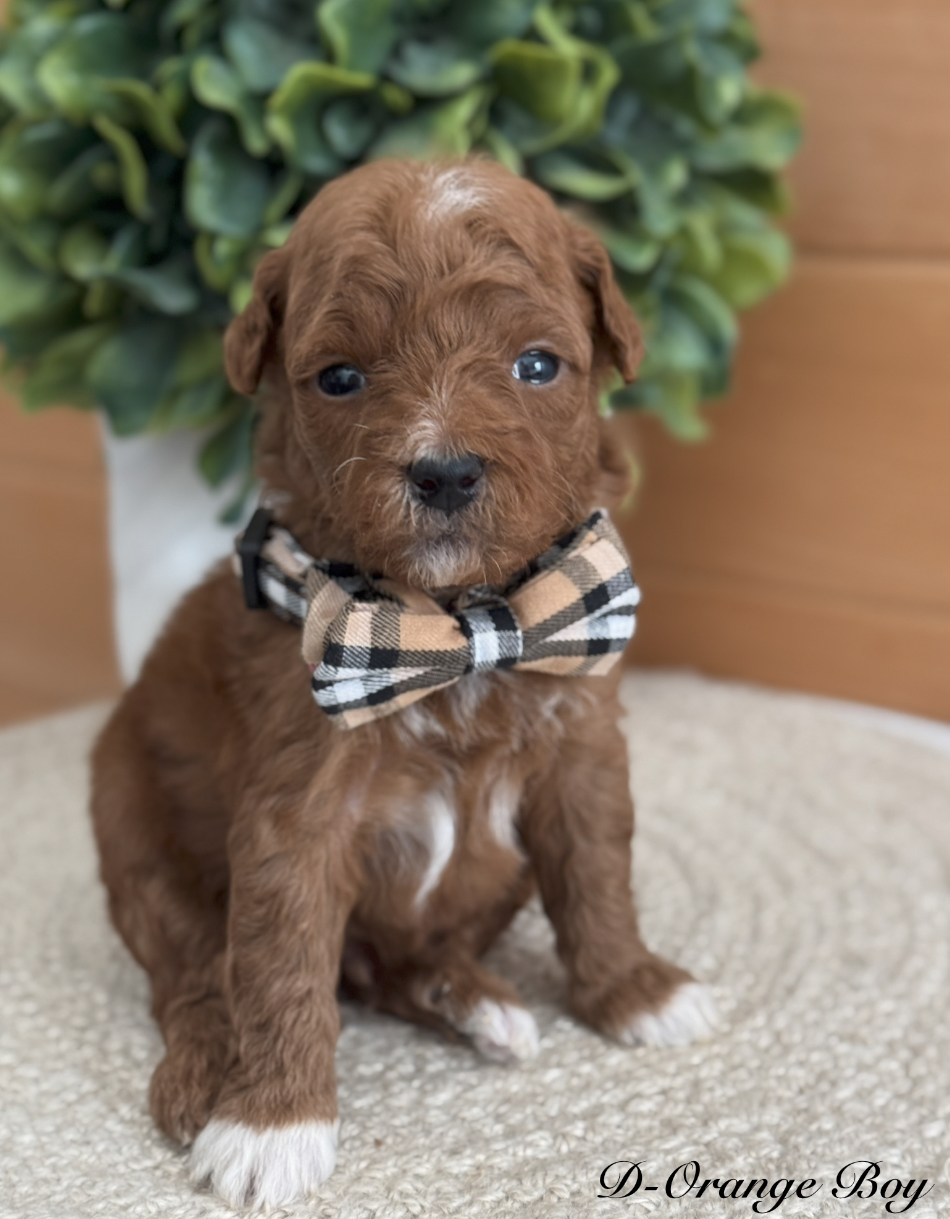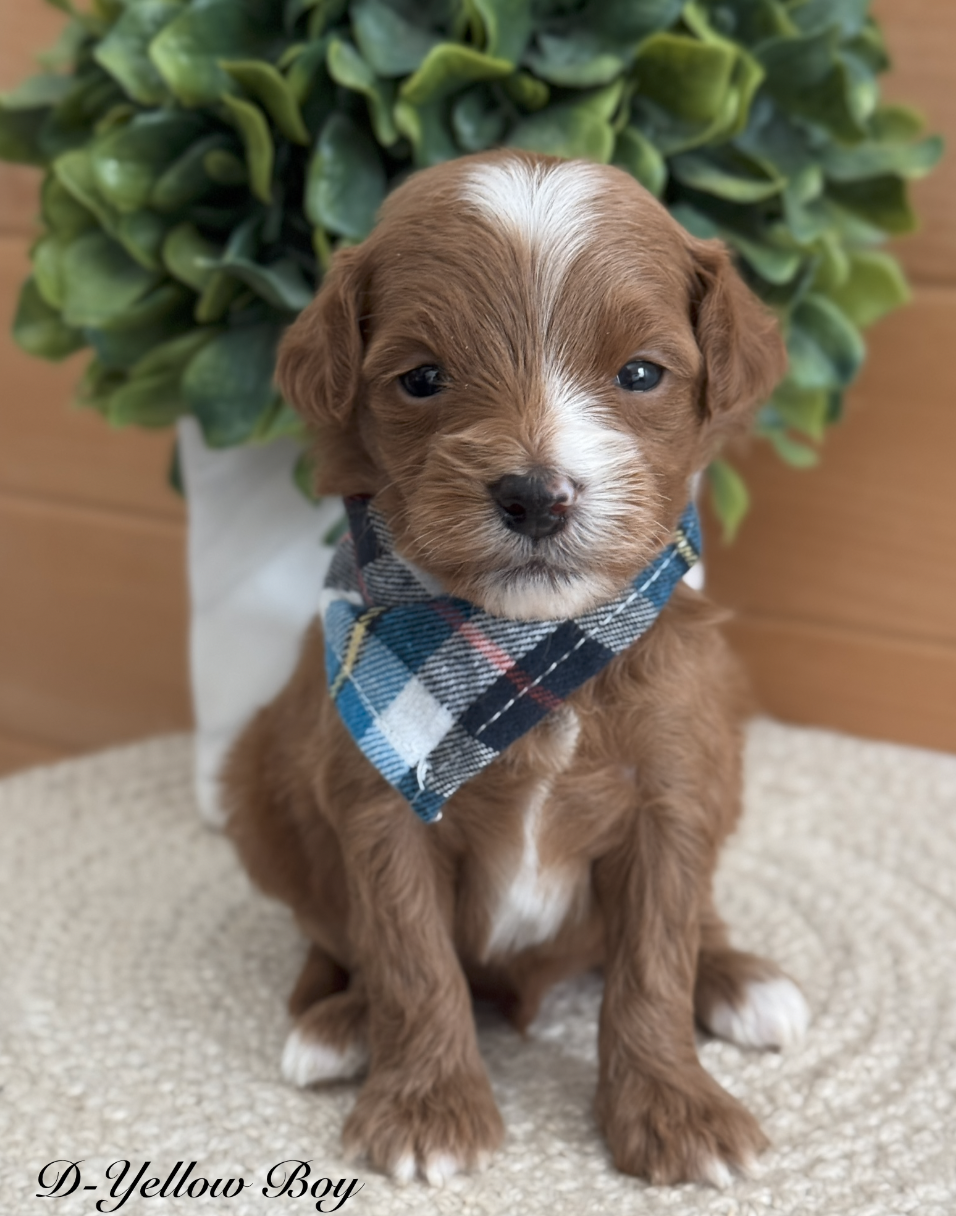What Not to Feed Your Goldendoodle | Toxic Foods for Dogs
Goldendoodles are smart, affectionate, and full of personality. It's your responsibility to keep them as healthy and happy as possible. The best way to do that is by paying close attention to what's going in their bowl.
Many dog owners don't realize that everyday foods we enjoy can actually be toxic to dogs. While your Goldendoodle may beg with those sweet eyes for a bite of your snack, giving in could lead to serious health issues.
In this article, we’ll let you know about what not to feed your Goldendoodle, why these foods are dangerous, and what to do if your pup eats something harmful.
Why Some Human Foods Are Toxic to Dogs
Dogs don’t digest food the way humans do. Our bodies can break down and filter out certain compounds that dogs simply can’t process. This means even a small amount of something harmless to us can cause digestive issues, neurological problems, or organ failure in dogs.
Goldendoodles, in particular, tend to have sensitive stomachs. They inherit this trait from their Poodle side and are also known for having allergies or food sensitivities. That’s why it’s especially important to monitor their diet and avoid giving them table scraps or unapproved snacks.
In short, feeding your dog something toxic isn't just a mistake, it can be life-threatening. Let’s break down the most dangerous offenders.
%20(1).jpg)
Toxic Foods for Dogs
1. Chocolate
Chocolate is one of the most well-known toxic foods for dogs. It contains theobromine and caffeine, both of which are stimulants that dogs can’t metabolize effectively.
The danger increases with darker chocolate. Baking chocolate and dark chocolate have higher levels of theobromine than milk chocolate.
How it affects dogs:
- Vomiting and diarrhea
- Rapid heart rate
- Tremors or seizures
- Restlessness
- In some severe cases, it can cause heart failure or death
If your Goldendoodle eats chocolate, don’t wait to see if they “seem fine.” Call your vet immediately with details on how much and what type of chocolate was consumed.
2. Grapes and Raisins
Just a few grapes or raisins can cause acute kidney failure in dogs. While the exact substance causing the reaction hasn’t been identified, the danger is well-documented.
Possible symptoms:
- Vomiting
- Lethargy
- Refusal to eat
- Dehydration
- Decreased or no urination
Kidney damage can happen fast, and it may be irreversible. Keep grapes and anything containing raisins out of reach at all times.
3. Onions and Garlic
Whether raw, cooked, powdered, or in seasoning blends, onions and garlic are highly toxic to dogs. They contain substances that can harm red blood cells and cause hemolytic anemia.
Symptoms may include:
- Weakness or fatigue
- Pale gums
- Fast heart rate
- Collapse in severe cases
Onion and garlic powder often hide in sauces, soups, and processed foods. Double-check ingredients before sharing any food with your doodle.
4. Xylitol (Artificial Sweetener)
Xylitol is found in sugar-free gum, candy, baked goods, and even some peanut butters. It’s highly toxic to dogs and can become deadly just hours after ingestion.
What it does:
- Causes a dangerous insulin spike
- Leads to sudden hypoglycemia (low blood sugar)
- Can cause liver failure
Symptoms of xylitol poisoning:
- Vomiting
- Weakness
- Loss of coordination
- Seizures
Always check ingredient labels before sharing snacks with your dog.
5. Alcohol
Alcohol affects dogs much more severely than humans. Even a small amount can cause serious health issues, and in some cases, death.
Symptoms of alcohol poisoning:
- Disorientation
- Vomiting
- Tremors
- Slow breathing
- Coma
This includes all alcoholic beverages and foods made with alcohol, like rum cake or beer-battered items. Never offer your pup a sip or bite—no matter how curious they look.
6. Caffeine
Found in coffee, tea, energy drinks, and chocolate, caffeine is dangerous for dogs because it stimulates the nervous system and heart.
Signs of caffeine toxicity:
- Hyperactivity
- Elevated heart rate
- Restlessness
- Muscle tremors
- Seizures
Even caffeine pills and tea bags can be enough to cause problems. Keep all sources safely tucked away.
7. Macadamia Nuts
These nuts are very high in fat and can irritate the pancreas, leading to pancreatitis. If left untreated, pancreatitis can cause multiple organ failure and may even be fatal.
Symptoms include:
- Vomiting
- Severe abdominal pain
- Muscle tremors
- High fever
- Weakness or inability to walk
- Depression
Skip the trail mix and keep macadamia nuts off your kitchen counters.
8. Avocados
Avocados have a toxin called persin that can lead to vomiting and diarrhea in dogs. While not all dogs react severely, it’s best to avoid them, especially in large amounts.
Other risks:
- The pit can block airways or cause internal obstruction
- High-fat content can trigger pancreatitis in some dogs
If your Goldendoodle accidentally licks some guacamole, they’ll probably be fine but don’t make it a habit.
9. Cooked Bones
You’ve probably heard that dogs love bones....but cooked bones can be dangerous. They tend to splinter, which can cause choking, internal punctures, or digestive blockages.
Risks include:
- Broken teeth
- Mouth or tongue injuries
- Obstructions in the intestines
- Perforation of the stomach or intestines
If you want to give your doodle a bone, stick with raw bones (under supervision) or vet-approved chew treats.
10. Raw Dough and Yeast
When raw dough rises in your dog’s stomach, it can expand and cause bloating, which is both painful and potentially life-threatening. In addition, yeast can ferment and produce alcohol inside your dog’s gut.
Signs of trouble:
- Bloated belly
- Discomfort or whining
- Disorientation
- Vomiting
If your Goldendoodle eats raw dough, head to the vet right away.
Other Foods That Are Unsafe
While not all human foods are toxic, some aren’t ideal for your dog’s health. Here are a few more items to be cautious about:
- Fatty meats or trimmings: Can lead to pancreatitis
- High-sodium snacks: May cause dehydration or sodium poisoning
- Spicy foods: Can irritate the stomach and lead to vomiting or diarrhea
- Dairy products: Many dogs are lactose intolerant
- Corn cobs: Often swallowed whole and can cause blockages
- Raw eggs or meat: Carry a risk of Salmonella or E. coli
What to Do If Your Goldendoodle Eats Something Toxic
If you suspect your Goldendoodle has eaten something they shouldn’t, quick action is crucial.
1. Stay calm. Dogs can sense your stress.
2. Identify what and how much they ate. Save any packaging or food remnants.
3. Call your vet immediately. If your vet’s office is closed, contact an emergency vet or:
ASPCA Poison Control: (888) 426-4435
Pet Poison Helpline: (855) 764-7661
4. Follow instructions carefully. Never induce vomiting unless told to.
Safe and Healthy Alternatives for Treat Time
Your Goldendoodle deserves treats that are both delicious and safe. Here are some healthy options to try:
- Carrot sticks
- Apple slices (without seeds)
- Blueberries
- Cucumber slices
- Plain pumpkin puree
- Cooked sweet potatoes
- Frozen green beans
- Dog-safe peanut butter (xylitol-free)
You can also try making homemade treats using dog-friendly ingredients like oats, bananas, and pumpkin. Just be sure to skip sugar, salt, and artificial additives.
.jpg)
Conclusion
Knowing what not to feed your Goldendoodle is one of the most important steps in keeping them safe and healthy. As pet parents, it’s up to us to make smart food choices on their behalf, because they trust us completely.
Some everyday foods can be harmful to dogs. Keep the list in this article handy. Stay informed, and if you’re ever unsure, call your vet.
Looking for more Goldendoodle care tips or training guide? Check out our blogs here.
And if you're looking for healthy, family-raised Goldendoodle puppies in Texas, we’re here to help. At Texas Goldendoodle Lovers, we focus on ethical breeding and raising our puppies with love and care right in our home. Each pup is socialized, healthy, and ready to become part of your family.
Browse our available puppies today and see who's ready to join your home.
FAQs
1. Can Goldendoodles eat table scraps?
It’s best to avoid it. Many common ingredients like onions, garlic, salt, and butter can harm your dog.
2. Are all nuts bad for dogs?
Not all, but macadamia nuts are toxic. Others, like almonds and walnuts, can cause choking or digestive issues.
3. Can dogs eat cheese?
In small amounts, some dogs can tolerate cheese. But many Goldendoodles are lactose intolerant, so it's best to limit dairy.
4. Is it okay to feed bones to dogs?
Avoid cooked bones. If you want to offer a bone, go for a raw one and supervise closely.
5. Can my dog eat peanut butter?
Yes, dogs can eat peanut butter, but only if it’s xylitol-free. Always read the label.

.jpg)



.png)
.png)
.jpg)
.jpg)


.jpg)
.png)
.jpg)
.jpg)
.png)
.jpg)


